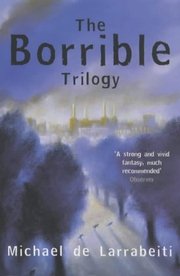 |

The Borrible Trilogy:
The Borribles, The Borribles Go for Broke, Across the Dark Metropolis
by Michael de Larrabeiti
(TorUK: Macmillan, £8.99, 726 pages, paperback; April 2003; ISBN 0330490850.)
There are now quite a few novels in the SF and Fantasy pantheon claiming
the status of classic, and some of them actually  deserve
that accolade. One of these latter novels is The Borribles. deserve
that accolade. One of these latter novels is The Borribles.
Michael de Larrabeiti had exactly the right upbringing to be an author:
born in Battersea, his father was a Basque, and after leaving school
he worked in film, travelled, travelled some more in exotic places,
then read French and English in Dublin and, later, in Oxford. Eventually
he gave all this up to devote himself to writing.
If you haven't yet read The Borribles, you are missing not just
a classic but an all-time classic. This trilogy of books, published
here in one volume, relates the mud-spattered, hilarious, sad, gritty,
exciting and altogether surreal tales of those infamous London creatures
the Borribles. A Borrible is a child... sort of... with pointy ears
and a suspicious disposition, who lives thieving and free-wheeling in
all the hidden, forgotten and filthy places of London. Borribles are
not grown-up but nonetheless they live forever, unless, that is, they
are caught by Borrible-snatchers or members of the SBG--the Special
Borrible Group of the Metropolitan Police Force. Clipping the ears of
a Borrible dooms them to adulthood and a life of 9-5 drudgery. Borribles
live for freedom, for exultant theft and freebootery, for the joy of
inhabiting the streets at night. There are many Borrible tribes all
over the capital city, each with their own characteristics: devious,
pollution-hardened Wendles of Wandsworth, Indian Borribles, punk Borribles
and even Rastafarian Borribles.
The plots all involve struggle, chase, escape and conflict. In book
one the Battersea Borribles discover a threat from their mortal enemies
the Rumbles (read, Wombles) who must be destroyed if the Borrible lifestyle
is to continue. Thus a party of eight Borribles is assembled by Spiff
the leading Battersea Borrible, none of whom have yet earned their names,
all of whom are keen to rip the straw out of the vile Rumbles. In book
two the Borribles have to escape the clutches of the dread Inspector
Sussworth and Sergeant Hanks of the SBG. As grotesques go, these two
characters are as brilliantly conceived as anything Dickens could have
imagined, the former a fascist with a hygiene obsession, the latter
a snot-guzzling, lard-arsed clod-foot. The police were never so well
satirised. In book two we also meet Ben the smelly tramp, and enjoy
a quite brilliant set-piece finale at the bottom of a mineshaft. In
book three the Borribles decide to remove Sam their equine mascot to
Neasden, where it is hoped he will survive out of the clutches of the
SBG. It is in this book that the author's knowledge of London and compassion
for those less well off comes to the fore, as the Borribles meet a clutch
of extraordinary characters, including Madge and Hugh the meths drinkers,
and the Queen Mum, aka Susan the tramp. The scenes where the Borribles
are captured by the meths drinkers are as moving as anything I have
read in the field of dark fantasy, the ghastly 'meffos' depicted without
sentimentality, in all their disgusting variety. Book three also includes
a set-piece in a slaughterhouse, and a superbly conceived finale in
an old tube tunnel.
What also sets this novel apart is the wonderful dialogue, steeped
in the Cockney idiom--and you know it's the real thing because of the
author's background. Every speech is beautifully crafted, every bit
of slang in exactly the right place. Cor blimey guv'nor, this ain't
yer manor! The humour is laugh-out-loud: Sergeant Hanks pulls out a
bogey and declares, "Hmm, first class that one, looks like a well-fed
whelk." The tragedy is sincere and affecting, the shadows are black,
and the Thames is dark, oily, deadly...
This really is the stuff of fantasy. Forget identikit Tolkien clones,
forget sword'n'sorcery, forget heroes with bulging biceps and all the
rest of that nonsense. If you want to read something unique, something
that will move and excite you, something inspirational, something written
with panache, verve and an unwavering gaze cast upon the dark truth
of London, read this.
Once read, never forgotten.

Review by Stephen Palmer.
|
 |



